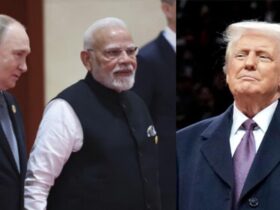The absence of Indian Prime Minister Narendra Modi from a summit in Malaysia, where US President Donald Trump is due to be a high-profile guest, has raised questions over the progress of tense US-India tariff talks over New Delhi’s continued purchases of Russian oil.
Modi briefly mentioned his “virtual” attendance at the upcoming Association of Southeast Asian Nations (ASEAN) summit in a post on Instagram, which focused on his “warm” relations with Malaysian Prime Minister Anwar Ibrahim and the building of the ASEAN-India Comprehensive Strategic Partnership.
Modi’s post did not provide further details on why he would not travel to Kuala Lumpur.
Anwar said he was told Modi would attend virtually due to “ongoing Diwali celebrations in India”, referring to the Hindu festival of lights.
Malaysia’s Foreign Ministry said that Trump is scheduled to come to Kuala Lumpur for the ASEAN summit on October 26. It will be the first stop on a three-nation Asian tour, which is expected to include a meeting with China’s Xi Jinping in South Korea. The White House has not confirmed Trump’s travel itinerary.
Both leaders have tried to ease tensions as the tariff standoff continues.
During a special Diwali event at the White House on Tuesday, Trump said he had a positive conversation with Modi and reiterated that India will stop buying Russian oil.
“We have a very good relationship and he’s not going to buy more oil from Russia,” Trump told reporters. “They ended it a long time ago and they’re continuing to reduce it,” Trump said, adding that Modi wanted to “see an end” to the war in Ukraine.
Modi thanked Trump for Diwali wishes and promised close cooperation on fighting terrorism without mentioning tariffs or oil.
Still, Modi’s absence from ASEAN has fueled speculation from the Indian PM’s political opponents that joining hands with Trump on the global stage would look bad at home.
Jairam Ramesh, a senior member of India’s main opposition Indian National Congress party, said on Thursday it would be “very risky” for Modi to be seen “getting physically involved” with Trump.
Ramesh said Trump’s current claims on Russian oil, as well as his repeated credit for stopping the war with Pakistan in April, which India denies, have become political liabilities for Modi.
When the US president initially made his claim last week, India’s opposition leader Rahul Gandhi had said “Modi is scared of Trump,” accusing the prime minister of “allowing Trump to take the decision and announce that India will not buy Russian oil.”
Trump and Modi’s bromance exposed
When Modi and Trump hugged each other at the White House in February, hopes rose that the cordial relations that existed between the leaders during Trump’s first term would continue.
However, India soon realized that it would not get special treatment as Trump imposed sweeping tariffs, including a 25% levy on some Indian exports.
In August, the Trump administration said India’s purchases of Russian oil were funding Moscow’s war in Ukraine, and imposed an additional 25% tariff, bringing the total to 50%, souring US-India relations to their lowest level in decades.
Last week, Trump further stirred the situation by claiming for the first time that Modi had “assured” him that India would stop buying Russian oil.
Indian officials have neither confirmed nor denied Trump’s claims.
New Russia sanctions increase pressure
However, Reuters reported on Thursday that Reliance Industries, the top Indian buyer of Russian crude, was preparing to “drastically cut” Russian oil imports.
“We don’t expect it to go to zero immediately because some barrels will come to the market through intermediaries,” a refinery source told Reuters on condition of anonymity.
“Recalibration of Russian oil imports continues and Reliance will fully engage with the Government of India [Government of India] Guidelines,” a Reliance spokesperson told Reuters.
The report comes after the US announced new sanctions on Russia’s biggest oil producers, Rosneft and Lukoil, which US Treasury Secretary Scott Besant said were responsible for financing the Kremlin’s “war machine”.
The move, the first direct targeting of Russia in the war by the second Trump administration, froze all US assets belonging to Russian oil giants, while allowing secondary sanctions on foreign banks doing business with them.
This could mean that banks in India would face penalties for facilitating Russian oil imports.
The US Treasury has set a November 21 deadline for companies to wind down transactions with Rosneft and Lukoil. Analysts have said the impact is dependent on US enforcement, and how banks will comply.
Currently New Delhi is on hold
As Russian oil rumors continue to spread, India’s Ministry of External Affairs continues to insist that the country’s priority is to maintain Indian energy independence and keep energy prices low for consumers.
Last week, Indian Foreign Ministry spokesperson Randhir Jaiswal said Washington has shown interest in deepening energy cooperation and talks are ongoing.
Jaiswal had stressed that India’s priority on oil imports was to “protect the interests of the Indian consumer in an unstable energy scenario”.
Sumit Ritolia, a New Delhi-based oil analyst at trade research house Kpler, told DW that India could “reduce” its Russian oil imports, but added: “I don’t think we can go to zero anytime soon.”
India’s oil purchases from Russia increased nearly 19 times from 2021 to 2024, from 0.1 to 1.9 million barrels per day, making Russia India’s top source of crude.
In 2022, New Delhi began buying barrels from Russia at a discount after Moscow started the war, and faced sanctions to cut oil revenues.
India has argued that at one time, the US actively supported Indian oil purchases from Russia to help stabilize global oil prices.
Edited by: Keith Walker
Written with reporting from DW Business






Leave a Reply